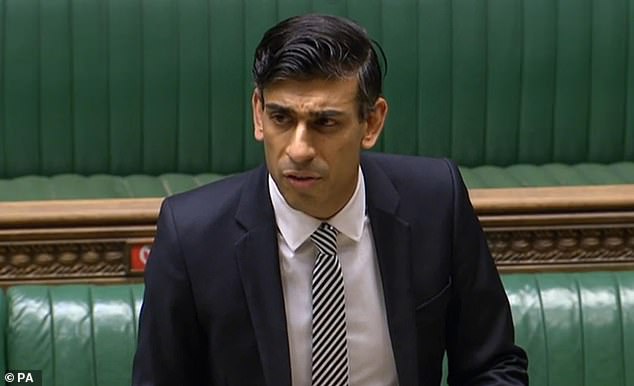Is Rishi Sunak set to extend the stamp duty holiday? Calls grow to keep relief after March 31 amid fears of a hit to housing recovery
- Chancellor Rishi Sunak is under mounting pressure to extend stamp duty cut
- Ducked questions on the issue as he was quizzed in the Commons this week
- Tory sources said the idea is among a number being considered for the budget
The temporary cut in stamp duty could be extended amid fears that a housing slump would derail hopes of a post-lockdown recovery.
Chancellor Rishi Sunak is under mounting pressure to move the end date for the homebuyers’ relief beyond its current March 31.
He ducked questions on the issue in the Commons this week, saying the cut was one of several support schemes that would have to be ‘considered in the round at the Budget’.
But Tory sources said the idea is among a number being considered for the March 3 Budget, when the Chancellor will once again try to inject life into the battered economy.
Chancellor Rishi Sunak (pictured) is under mounting pressure to move the end date for the homebuyers’ relief beyond its current March 31
‘The level of economic uncertainty means that the Treasury is having to look at options for dealing with all sorts of scenarios,’ said one.
‘Things that have previously been ruled out are back in play. Could that include stamp duty? It’s certainly possible.’
The Chancellor slashed stamp duty last July, raising the threshold for paying the hated tax from £125,000 to £500,000.
The nine-month cut has meant most people moving home will pay no stamp duty at all. Buyers of more expensive properties can save up to £15,000.
The intervention kick-started the housing market and led to a surge in prices. The aim was to provide a boost to the economy amid a mini recession. But with the UK now entering a double-dip recession, some ministers are questioning the wisdom of slamming the brakes on the housing market, which is a key driver of economic growth.
MPs will debate calls for a six-month extension of the tax cut on Monday. Tory Elliot Colburn, who will lead the debate, said a temporary extension was vital, if only to allow deals already in train to be completed.
Beneficial for wider economy
Although the housing market has remained open during the second lockdown, transactions have been slowed by illness and self-isolation among estate agents and solicitors.
Mr Colburn said some lenders were warning up to 70 per cent of current deals may fail to meet the March 31 cut-off point, after which many would collapse.
‘The pandemic has changed things,’ Mr Colburn said. ‘March 31 might have looked a reasonable cut-off point when the stamp duty cut came in last summer, but it now looks eminently sensible to extend it.
‘Bringing back stamp duty in full during a recession would cause a significant amount of damage. At the very least we should be looking at a phased withdrawal to allow all transactions under way by the end of March to complete. But really it would be sensible to extend the discount until the economy is in a stronger place.’
The powerful Northern Research Group of MPs who won ‘red wall’ seats from Labour at the last election has also called for an extension.

Although the housing market has remained open during the second lockdown, transactions have been slowed by illness and self-isolation among estate agents and solicitors (file image)
Carlisle MP John Stevenson said: ‘Maintaining confidence in the housing market is beneficial for the wider economy. The housing market is a big chunk of the economy – it has a huge supply chain behind it.’
The Treasury, which has previously ruled out extending the stamp duty cut, declined to comment on ‘speculation’ about its future ahead of the Budget.
A Treasury source acknowledged Mr Sunak was examining a range of options for shoring up the economy and helping people back into employment.
‘At the moment it is hard to know what the right level of immediate support will be, what support will be needed for the opening up of the economy and to what extent it will be helpful to talk about the longer term,’ the source said.
